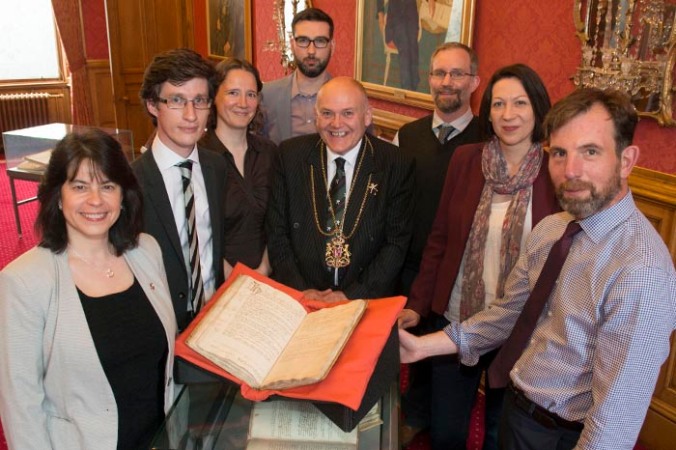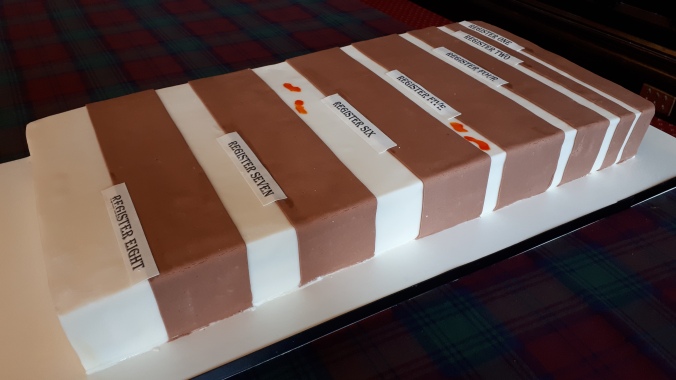On the evening of 14 June a special event was held in the Town House to mark the completion of the Law in the Aberdeen Council Registers project.

L-R: Vice-Principal Professor Marion Campbell, Dr Andrew Simpson, Dr Edda Frankot, Dr William Hepburn, Lord Provost Barney Crockett, Dr Jackson Armstrong, Dr Claire Hawes, City Archivist Mr Phil Astley. Photo Credit: Norman Adams / Copyright Aberdeen City Council.
The eight earliest-surviving council register volumes were on display, and music and talks highlighted vignettes from the new resource created by this project, Aberdeen Registers Online: 1398–1511. Lord Provost Barney Crockett spoke on behalf of the City of Aberdeen, and Vice-Principal Professor Marion Campbell on behalf of the University of Aberdeen.
The event opened with a performance on recorder by Ruaraidh Wishart, Ed Friday, Kate Friday, and Marie McLean of a special composition entitled Fantasia for a Doric Fishman. The piece drew inspiration from the so-called ‘Fishman’, one of the most well-known decorations in the registers (see ARO-2-0102-01). Until recently moving to Abertay University, Ruaraidh Wishart was a senior archivist with the Aberdeen City and Aberdeenshire Archives.
Short talks and highlights were given by LACR members, including Jackson Armstrong, Phil Astley, Edda Frankot, Andrew Simpson, and Claire Hawes. The evening also showcased some creative follow-on projects in response to the registers.
William Hepburn introduced Playing in the Archives, his Arts and Humanities Research Council (AHRC) Creative Economies Engagement Fellowship, which investigates how Aberdeen’s registers could provide the inspiration for video game development. William explained how he is assessing the effectiveness of video games as a scholarly medium for examining the burgh records and the historical subjects they inform.
Claire Hawes and musicians Davy Cattanach and Paddy Buchanan performed four Songs from Medieval Aberdeen. Claire’s introduction to their music explained that their composition project was made possible with a 2018 Creative Funding Award from Aberdeen City Council. The trio set out to explore how songwriters can use historical material in their work. These original songs were the result, inspired by stories and themes from the records, and the Scots language of the registers.
There was also a special cake, decorated by Aberdeen cake makers O’Caykx, which displayed some of the information about the words and languages of the registers in icing.

ARO Infographic Cake: Showing proportions of Latin and vernacular words in each register through the scrumptious medium of icing. Photo credit: Jackson Armstrong.
The cake icing depicted the proportion of words in each register in Latin (dark icing) and Scots (light icing). The small amount of orange marked in registers five and six reflects the appearance of a small amount of Dutch (or Middle Low German) in those volumes. The later registers have a greater proportion of content in Scots, and a greater number of words overall. It was a delicious way to mark the completion of the project!
Pingback: Songs of Medieval Aberdeen performed in the Scottish Parliament | aberdeen registers